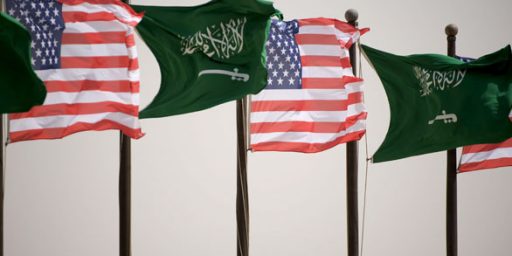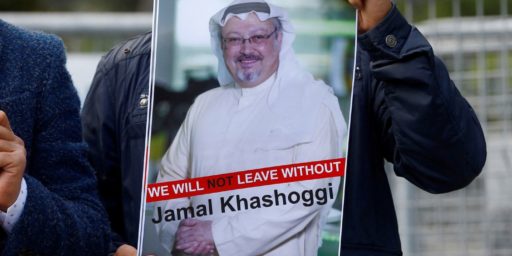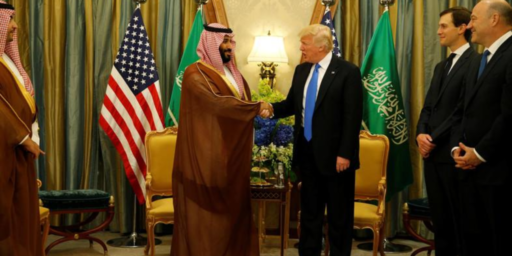Iraq Foreign Fighters Mostly Saudis and Libyans
Most of the foreign fighters in Iraq come from “allies” Saudi Arabia and Libya — but foreign fighters make up an incredibly tiny percentage of the insurgency, U.S. military intelligence reports.
Saudi Arabia and Libya, both considered allies by the United States in its fight against terrorism, were the source of about 60 percent of the foreign fighters who came to Iraq in the past year to serve as suicide bombers or to facilitate other attacks, according to senior American military officials.
The data come largely from a trove of documents and computers discovered in September, when American forces raided a tent camp in the desert near Sinjar, close to the Syrian border. The raid’s target was an insurgent cell believed to be responsible for smuggling the vast majority of foreign fighters into Iraq. The most significant discovery was a collection of biographical sketches that listed hometowns and other details for more than 700 fighters brought into Iraq since August 2006.
The records also underscore how the insurgency in Iraq remains both overwhelmingly Iraqi and Sunni. American officials now estimate that the flow of foreign fighters was 80 to 110 per month during the first half of this year and about 60 per month during the summer. The numbers fell sharply in October to no more than 40, partly as a result of the Sinjar raid, the American officials say.
Saudis accounted for the largest number of fighters listed on the records by far — 305, or 41 percent — American intelligence officers found as they combed through documents and computers in the weeks after the raid. The data show that despite increased efforts by Saudi Arabia to clamp down on would-be terrorists since Sept. 11, 2001, when 15 of the 19 hijackers were Saudi, some Saudi fighters are still getting through. Libyans accounted for 137 foreign fighters, or 18 percent of the total, the senior American military officials said. They discussed the raid with the stipulation that they not be named because of the delicate nature of the issue.
United States officials have previously offered only rough estimates of the breakdown of foreign fighters inside Iraq. But the trove found in Sinjar is so vast and detailed that American officials believe that the patterns and percentages revealed by it offer for the first time a far more precise account of the personal circumstances of foreign fighters throughout the country.
[…]
Over the years, the Syrian border has been the principal entry point into Iraq for foreign insurgents, officials say. Many had come through Anbar Province, in west-central Iraq. But with the Sunni tribal revolt against extremist militants that began last year in Anbar, Al Qaeda in Mesopotamia and other jihadists concentrated their smuggling efforts on the area north of the Euphrates River along the Syrian border, the officials said.
[…]
American military and diplomatic officials who discussed the flow of fighters from Saudi Arabia were careful to draw a distinction between the Saudi government and the charities and individuals who they said encouraged young Saudi men to fight in Iraq. After United States officials put pressure on Saudi leaders in the summer, the Saudi government took some steps that have begun to curb the flow of fighters, the officials said. Yet the senior American military officials said they also believed that Saudi citizens provided the majority of financing for Al Qaeda in Mesopotamia. “They don’t want to see the Shias come to dominate in Iraq,” one American official said.
That last point is crucial: The insurgency is almost entirely domestic but it has been stoked and funded by a greater Islamist movement from outside.
via OTB News
Image source: International Institute for Counter-Terrorism





I’d just note that absent a total ban on Saudi males’ leaving the country, there’s not a whole lot the Saudi government can do to stop would-be jihadis from leaving the country.
Saudis (males, anyway) generally have the right to travel. A few have their passports lifted for apparently political or criminal reasons. If one’s name is not on the prohibited list, then one can drive, fly, or take a bus or boat to any contiguous country. While the border with Iraq is now being monitored by patrols and electronics, there are long borders with both Jordan and Yemen over which one can more-or-less simply walk. Then there are the two coastlnes, the Red Sea and the Gulf. Get on a boat in the KSA and you can land in a lot of places.
Saudis don’t need visas to enter those neighboring country; for some, all they need is an ID card.
The Saudi government does look for patterns in the entry and exit stamps in passports of returning Saudis. If they find suspicious patterns, they bring that person in for questioning. For a while, there was a rash of ‘lost passports’, an attempt to veil actual travel. That is now a sufficient flag to prompt interrogation. ‘Lost passports’ are not automatically replaced, either.
On the money front, there are certainly unanswered questions. But there’s also the problem that most of the capital owned by individual Saudis (the wealthy ones and counted in the tens of billions of dollars) is held outside Saudi Arabia and is not subject to Saudi banking laws.
Instead, it’s in banks and investments around the world. Depending on just where it is, a transfer of $4K or $9K will not flag any monitoring in those countries. The money falls between the cracks of state monitoring and is totally invisible to the Saudi government’s monitoring.
Then there’s the problem of cash. Cash can simply be carried from place to place, with no electronic monitoring at all. The Saudis do have laws about the amount of cash that can be carried in/out of the country, but as elsewhere, that’s not the most difficult restriction to avoid. It happens in the US regularly.
Our own media and democrat politicians frequently tell us “a majority” of Americans want us to pursue a course in Iraq that would reasonably be regarded as surrender. If so many Americans are fine with losing, why should we be surprised other “allies” have citizens who want to help us do just that?
That’s true as far as it goes, John, but I think it needs to be taken a little farther.
If you build a warehouse, fill it full of dynamite, dig a moat around it, fill it full of gasoline, and then, when somebody points out that it’s a safety hazard you might reasonably answer “Well, what are we supposed to do, ban sparks, flames, lightning and anything else that might conceivably set it off?”
The KSA has a large pool of young men, many of whom are unemployed, an economy that continues to be highly dependent (and centralized) on the oil sector, who have been taught intolerance of non-Muslims and non-Wahhabi Muslims in the schools and by imams some of whom receive government stipends for their work. The population growth, the economy, the schools, and the imams are all at least influenced by the Saudi government.
Let me put it another way. If and when billionaires in the U. S. start raising private armies to go overseas and raise hell, I’ll think that the U. S. government is justified in taking steps to reduce that if not eliminate it entirely.
Saudi Arabia is screwed up, no question. How to get out of a mess they created is another question.
Make-work projects won’t work because young Saudis feel there are enormous job sectors beneath them. Dig a ditch? Forget it. They expect to be ‘managers’ getting paid for doing little or no work.
They already received an education that suits them for little. I suppose forcing all young men back into school for another 3-5 years to ‘un-teach’ them might do something. I’m not sure what, though. Public statements by senior clerics, by senior gov’t officials are all condemning both terrorism and foreign jihad. The bell needs a lot of unringing.
The economy is the economy. The new-found oil wealth is being spread around in infrastructure projects, but as noted above, the ones who will benefit most from the construction aren’t going to be young Saudis. They’ll be more immigrant labor.
The government gave its employees a 15% raise last year, the first in nearly 20 years. But the government is getting smaller as the country denationalizes most of its industries. The father’s of today’s young men were all but guaranteed gov’t jobs. That’s just not feasible today. Besides, haven’t we been learning that it’s not economic despair that creates jihadis?
Further crackdowns on the imams is always good. Even though thousands have been jailed, with most going through ‘re-education’, some of them clearly aren’t getting the message. Maybe withholding their $500/mo. government stipends would have a salutary effect.
Since the destruction of the ‘Afghan Arab’ armies in Afghanistan, I don’t know which individual has his own standing army.
Well if this doesn’t screw up plans for Iran I don’t know what will. I do not know if this is news to people here, but as long as we are in Iraq we will be a magnet for radical fundamentalists, thus them flooding Iraq to kill American’s. But hey fight em there so we don’t have to here right? Morons.
I guess the Saudi media is watching Outside the Beltway. Tomorrow’s edition carries a story on the very topic. I’ve blogged it: Saudi Ex-Jihadi Tells His Tale
How do you establish that the insurgency is almost entirely domestic from the information provided?
Stories like this ought to be required to mention that nearly all of the 9/11 hijackers were Saudi, too. And yet somehow we thought Iraq was a greater threat. Gee, thanks, neocons.
while my biases are such that I would be more than willing to accept these results I would also like to point out that these results are likely to underestimate the flow of Iranian fighters.
The data was found in western Iran and probably does a very good job of identifying the nationality of foreign fighters that enter Iraq through Syria. But Iranian fighters are unlikely to enter through Syria. Rather they are more likely to cross their common border. Consequently, this study is probably biased if Iranian fighters are a significant part of the problem. On the other hand there is little evidence from other sources that Iranian fighters are a significant problem.
davod: this is due at least in part to incomplete reporting. The UK’s Guardian reports that there are 25,000 militants in US custody in Iraq.
Of that number, 305 are Saudi, 137 are Libyan, 68 Yemeni nationals, the third-biggest source. There were 64 fighters from Algeria, 50 from Morocco, 38 from Tunisia, 14 from Jordan, six from Turkey and two each from Egypt and France. That adds up to 682 foreign fighters. Subtract that from the 25K figure for militants in detention, and it certainly looks like the vast majority are indigenes.
More at Saudis in Iraq: Numbers Decreasing
M1EK: It also might be useful to note that Khaled Sheikh Mohammed said that he recruited Saudis because they could get US visas easily and that they didn’t even know what they were signing up for.
I know that doesn’t fit the narrative, but it does fit the facts.
John, I’ve always thought that Saudis were recruited deliberately for another reason, too: in an attempt to provoke an attack against the KSA by the US.
Dave: I doubt that a physical attack on the KSA was intended. Rather, it would drive a wedge between the KSA and the USA. The plot certainly succeeded in that regard.
Yeah, we sure stuck it to the Saudis, didn’t we? Why, just recently, our President has almost but not quite had the balls to say something about the woman getting her jail sentence doubled for getting gang-raped.
Bush didn’t have to say anything. It was quite clear what Americans thought about that verdict. In fact, it was quite clear what the civilized world thought about it. Including many Saudis.
You might check out the Saudi papers for their commentary.